Zhou Xiaohu and David Elliott
in conversation
On the occasion of Zhou Xiaohu’s solo show at MOMENTUM in Berlin, Randian asked Xiaohu and exhibition curator, David Elliott, to discuss the proverbial.
If shit cost money, the poor would have meters on their arseholes
Attributed to K. Marx
The “surprising package” in question here is Selina Abromovic (aka “Baby No 1″) on the “Sexy Hotline” that, using the template of late-night sex advertisements on German TV, Zhou Xiaohu has created to sketch out her impressive physical allure. But this description may also be extended to the strange collisions of media, styles, identities and meanings that recur throughout the whole of this Chinese artist’s work and which endow it with its unique impact. In this multifarious package, different representations about gender and the power of sex are woven together with surrealist élan in between equally strange propositions about society and the way power is structured within it.

Still image from the video installation
In the aftermath of the world financial crisis of 2008, the theories and ideas of Karl Marx have been under re-evaluation in the West and these have undoubtedly influenced Zhou’s approach, although his perspective on them is that of a citizen of a country outside this framework, ostensibly still governed by Marxist ethics and ideology. This short conversation between the artist and a curator unpacks how Zhou has built up the images, symbols and relationships in his new work “Das Kapital No. 1 – Questionnaire Show” (2015), an interactive installation presented for the first time in MOMENTUM, as well as in three previous related videos.
David Elliott: Ms. Abromovic will be making eleven live appearances at MOMENTUM during this exhibition as the protagonist in your new work “Das Kapital No. 1 – Questionnaire Show”, and in between them, following the style of her fictitious on-line presence, her performances will also be projected this role she will be playing the part of a stripper and engaging those visitors who wish to speak with her on a hot-line of your devising that veers ironically between sex and general questions of perception about economics, migration, aspiration, communication—and misunderstanding—that she articulates through the form of a questionnaire that you have written.
Provocatively, you seem to be addressing a number of taboos in this work. You introduce the sex industry as a symbolic element into a discussion about the remit and function of contemporary art. And then you frame contemporary art in relation to a discussion about power and the world as it surfaces in understandings (and misunderstandings) about identity, role play, and international politics. And then you place this work within a larger exhibition that is baldly and simply called “Scheisse – Shit”.
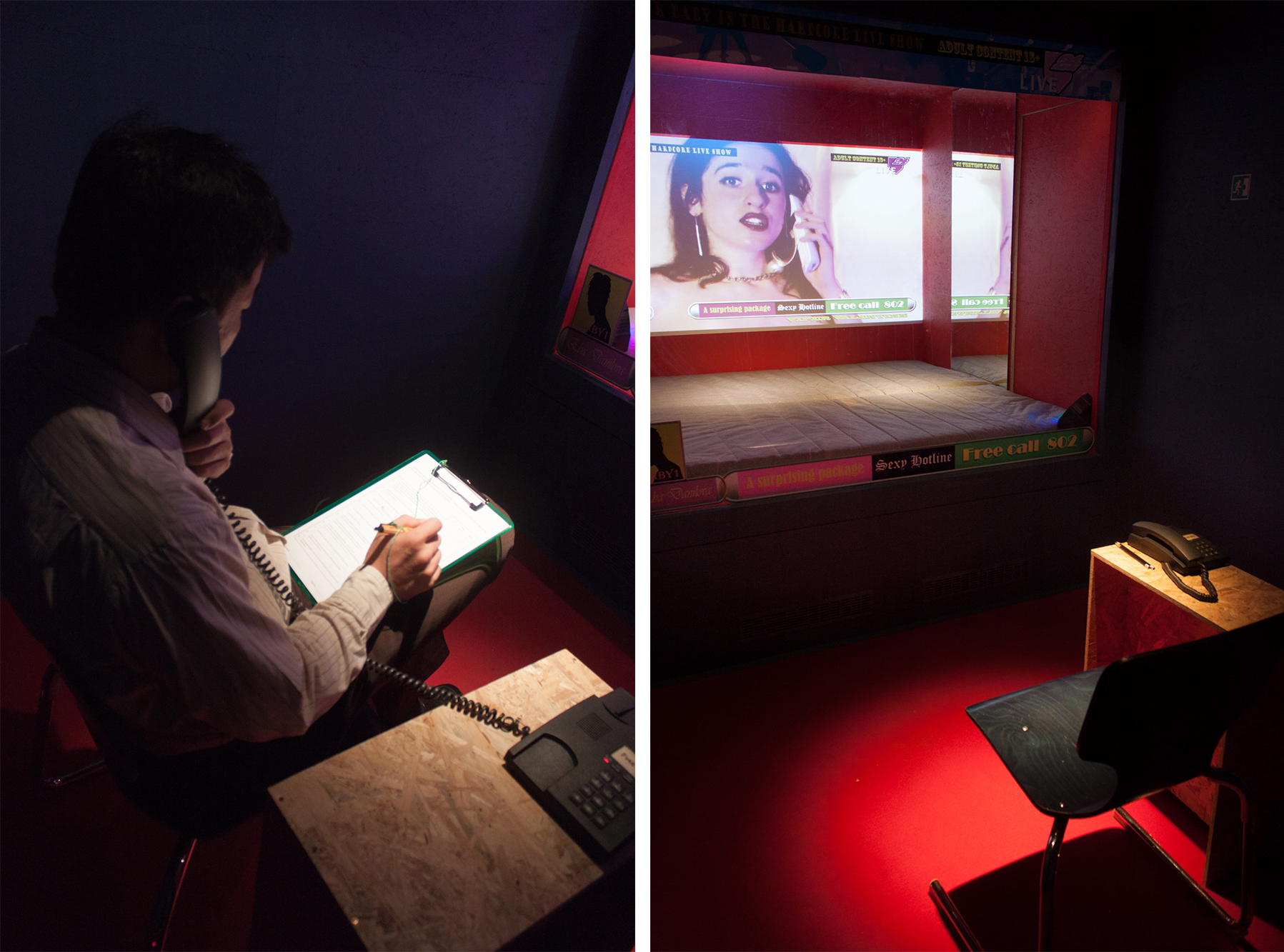 资本论No.1—问卷秀 / Das Kapital No.1—Questionnaire show by Zhou Xiaohu, 2015
资本论No.1—问卷秀 / Das Kapital No.1—Questionnaire show by Zhou Xiaohu, 2015Scheisse Exhibition in MOMENTUM, 2015
Installation shots by Marina Belikova
So, it seems to me that in the form of a parody of a questionnaire, or a Talk Show, you have brought these disparate elements together to address questions of value in art, the market and the world, and have added to this an ironical view of democracy (in that MOMENTUM does not charge an entrance fee and, in theory, any adult can participate), to achieve an impact that is intentionally banal. Any sense of gravitas has to be derived from an apprehension of the bizarre nature of the theatrical framework you have created in this work and the questions that hold it together.
Do you regard the changing interactive “tableau” of “Das Kapital No. 1″ as a symbolic portrait of the mechanisms of contemporary capitalism? And what relationship do you see it as having with the ideas and predictions of Karl Marx’s Das Kapital that was first published in the 1860s?
Zhou Xiaohu: What I know about Das Kapital is no more than the dry explanation my teacher gave me when I was at school. As a result, I just started out from the headings that I set out in my questionnaire, the answers to which do compose a kind of portrait. In choosing this title for the exhibition, “Scheisse-夏色”, I was thinking about the “shock of ideological antiquity” which is based on “News from Ideological Antiquity”, the subtitle of German film director Alexander Kluge’s 2008 documentary Marx/ Eisenstein/Das Kapital which has been widely shown and discussed in China. In this film, the slogan “Let’s fight for an inch of silk stocking” for me has a contemporary relevance in that it brings together sex, consumerism and ideology. Starting out from Sergei Eisenstein’s abortive project in 1927 to make a film based on Marx’s Das Kapital, Kluge talks about the “capitalism embedded in our hearts”, but I actually feel that we have entered a period in which capitalism is embedded in our flesh. We all exist as players in the everyday commedia dell’arte of Das Kapital.
I like Kluge’s Eisensteinian way of putting his film together which also reminds me of Powerpoint presentations or network links in which each word entry can be clicked, opened, further discussed, and then reassembled in a form of montage. I have always used different readymade “non-art” objects in my works and in doing this I try my best to create unexpected elisions and connections between them in order to find new frameworks for seeing things, and then I add my own wild poetic ideas to this mix. I view art as a kind of scalpel, and it is my job to decide how to cut the different paradoxes of daily life into pieces by using parallel simultaneities of different time frames and zones. I describe what I do in this way as “spatial montage”.
DE: Ms. Abromovic’s presence here then may be understood on both symbolical and actual levels. Initially, she represents both consumption and desire as her costumes are close to those advertised on the “website” you have made for her but, evidently, she is also being employed to carry out specific tasks by asking the different questions you have made up for her. Did you discuss with her the ideas behind the work and her role in it beforehand or is she more like a marionette in this commedia? Does she have any freedom in how she carries out her work?
ZXH: Yes, I have described to her what I want to achieve and what I would like her to do. And, of course I pay her for her work. It’s important for me that she is an active participant in developing this role and is engaged with the questions I have raised; she has said to me on several occasions that she likes this kind of performance which is different from the kind of performances she usually makes. I discussed my questions with her and modified some of them and, like me, she also wants to know about the range of responses people will give to them. In the interactive “sub-cultural game” of Das Kapital, she plays a role that is as important as my own role and that of the viewers—we are all involved in it together.
I am not at all interested here in trying to “expose” the situation of sex workers in Berlin. Clearly, the fictional persona of Ms. Abromovic sees herself as a worker making a living from the value of her own body (testifying the value of her labor by arousing people’s desire through dancing), this is the ready-made aspect of the performance with which I work. But, in my attempt to crash together the different energies of sex and ideology, the usual format of such a performance has been short circuited by transplanting an economic-ideological questionnaire into it. The questions devised for this are just small stones lobbed into a larger mix that make all kinds of different ripples. Like self-generated chemical reactions they will reveal people’s ingrained attitudes and I hope they will generate new perspectives that question the present and future of the everyday theater of the hyper-capitalism within which we live.
DE: Marx wrote Das Kapital in German, the title of the exhibition is a German expletive, you have chosen as its protagonist a young woman who is working in Germany, the model that you have used for the video presentation in which she appears is a pastiche of late-night, sex phone-in advertisements on German TV, and you have just completed a DAAD residency in Berlin. Do you see this work as having any specific relevance to Germany or do you see it more as having a more of a “universal” reference?
ZXH: Living between two different social and cultural backgrounds opens up many possibilities for nuance as well as for misunderstanding, particularly when both Germany and China have so deeply suffered (in different ways) from the insanity of utopian ideologies. Wherever I am I work with what I find around me but, moving between these two particular ‘worlds,’ I try to find some kind of general expression in which I can create unconventional forms of surprise either through contrived events or through poetic means that share a similar emotional impact. As well as the “readymades” you have just listed, undoubtedly Bertolt Brecht’s theatrical articulation of Verfremdungseffekt has been an influence here as has been the Russian Formalist writers’ idea of ostranenie or estrangement.
We are not able to avoid the chaotic effects of globalization in which the beating of a butterfly’s wings in one part of the world is amplified in the daily realities of such “migrant birds” as myself. The rapid speed and extension of media, communications and scientific knowledge have brought us to a point at which an isolated problem in a particular place may quickly become a common global disaster.
In terms of the title of the exhibition this, as you mentioned in the press release, “is intended to reflect not upon [my] view of art but on the conditions in which all work is made, including art”. I believe this voices both an objection to and a negation of the present conspiracy between art and global capital. How ironic it is that the phonetic translation of “Scheisse” into Chinese is “夏色” which means the color of summer!
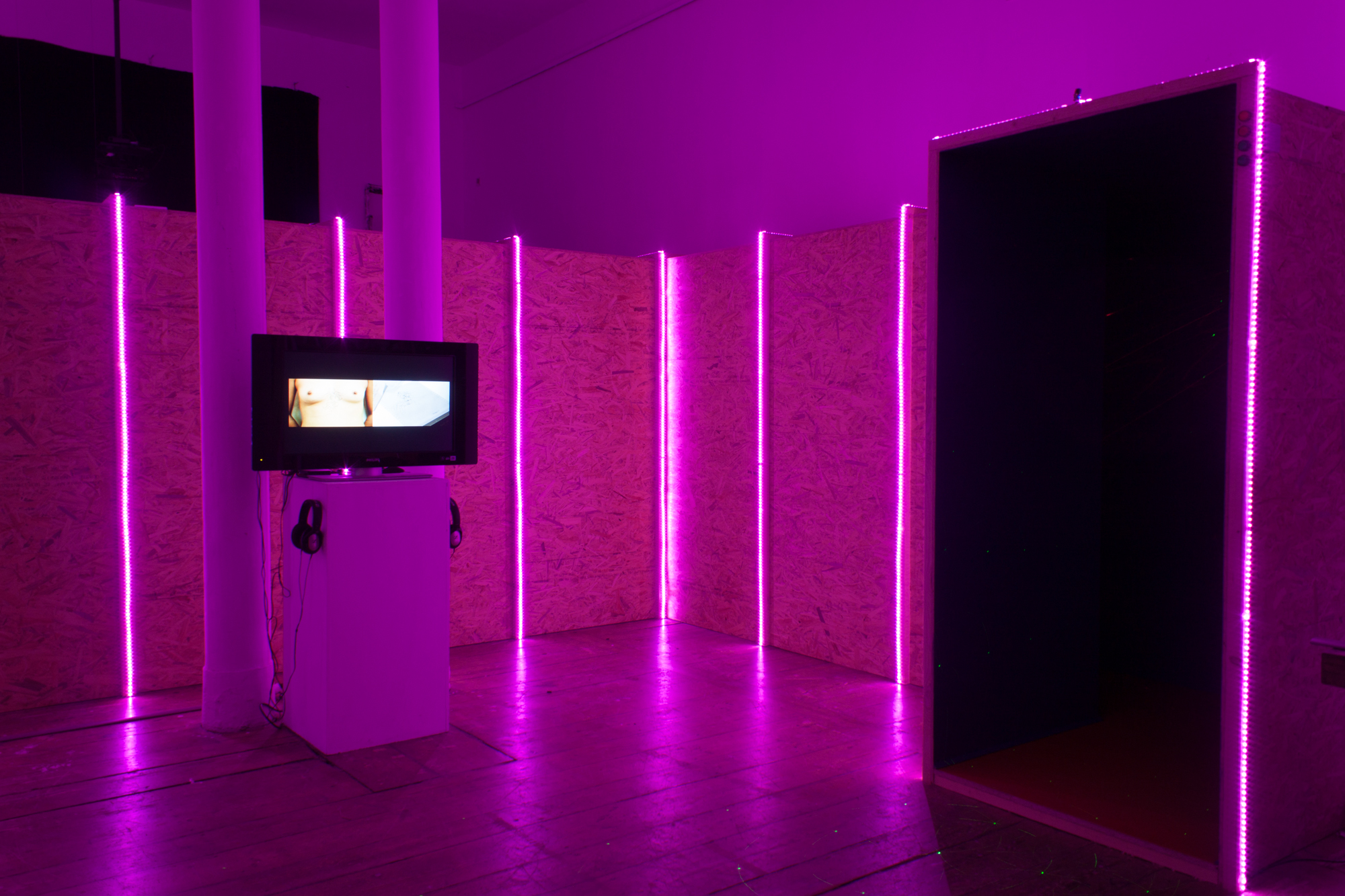
Scheisse Exhibition in MOMENTUM, 2015
Installation shots by Marina Belikova
DE: Capital seeks to extract value from both labor and consumption. Do you think that the voyeuristic element that you have engineered in this work serves as a paradigm for all consumption?
ZXH: When I took on the symbolic role of the initiator of this ‘paradigm for consumption’, this was based on the exploitation of the surplus value of Ms. Abromovic’s role. However, I think that every one who sees the work is also an exploiter and that they should ‘pay’ for their visual consumption with their own labor by thinking critically about the performance, answering the questionnaire and leaving their signatures. These labor relations form a strange, paradoxical moebius strip in which all parties are both exploiting and being exploited by each other.
DE: I would like to know about how you deal with the question of labour in this work and how, as Ms. Abromovic’s temporary employer, you negotiated a contract with her.
ZXH: Before I reached an agreement with Selina Abromovic (incidentally, she chose this alias as an echo of the name of a well-known performance artist), I had previously visited a number of nightclubs to find a dancer to work with me. I had discussed this with a number of women and was surprised to find that they were all interested in working in an art space. Their reluctance, however, came from reaching a deal about it with their bosses and, when it came to this, they all hesitated. I then made contact with “Ms. Abromovic” and offered her an employment contract with a set fee to play the role of a stripper of that name, both live in the performance and in the film I directed.
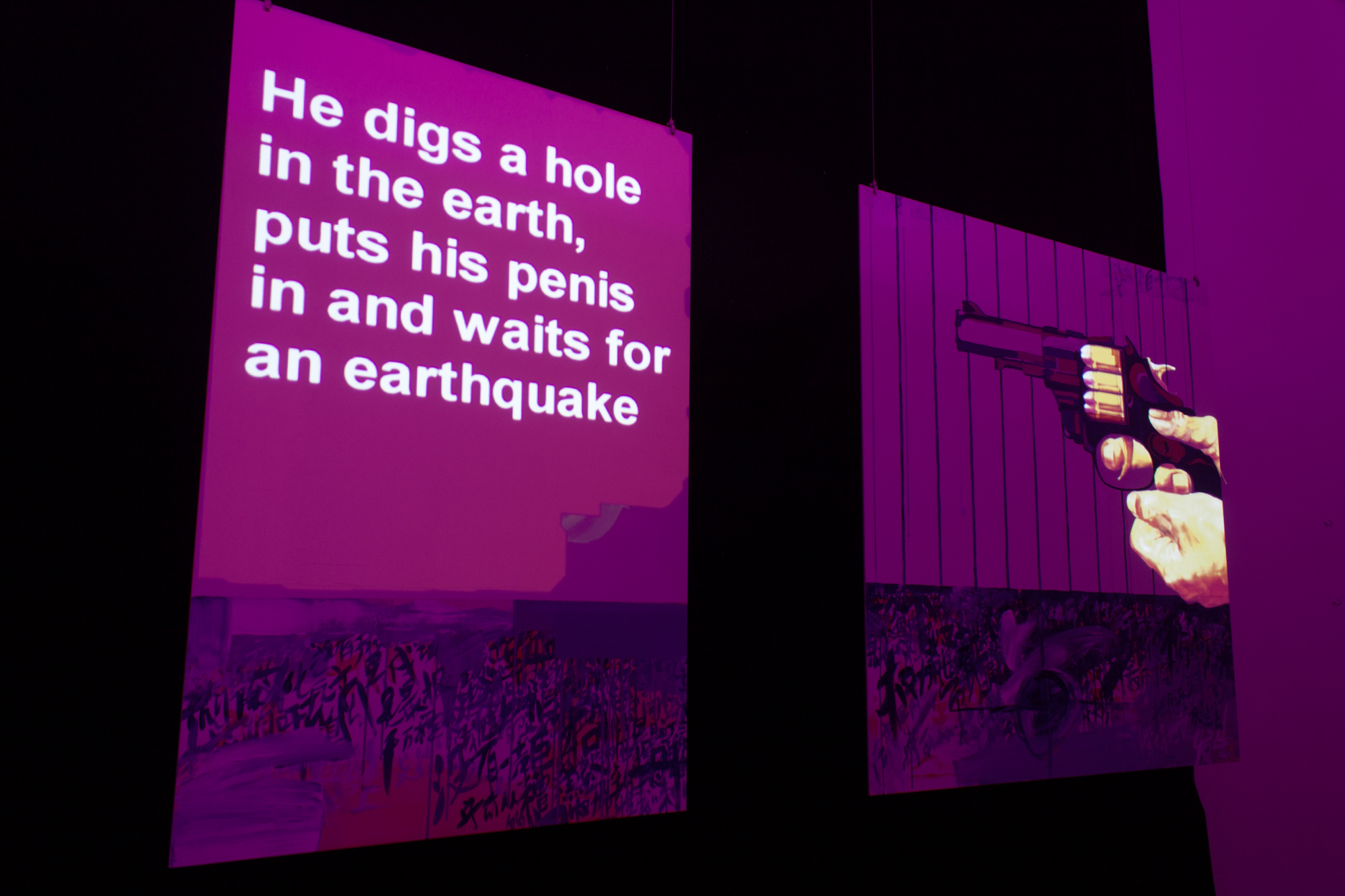
Scheisse Exhibition in MOMENTUM, 2015
Installation shots by Marina Belikova
DE: You were born in the city of Changzhou in Jiangsu Province in 1960, so you were six years old when the Chinese Cultural Revolution began. It was a time of great social and political turmoil with the mobilization of mass demonstrations and the persecution of intellectuals, “rightists” and “counter-revolutionaries”. What are your memories of this time? Did this experience feed into the attitudes towards the masses and power that surface in so much of your work?
ZXH: I don’t have many memories of this time as I was very young when the Cultural Revolution started but I recall very painful events around my grandfather and my family was not alone in experiencing disruptive violence. The Cultural Revolution came to an end in 1976 and throughout the 1980s and ‘90s the whole country moved from a system of orchestrated collective idealism towards an equally intoxicated collective capitalist “realism”. As I got older, I realized that both extremes were equally crazy because they perpetuate themselves by manipulating and inflaming people’s passions.
Today, as a “survivor” of these times, I am concerned that a new kind of enlightenment is created out of our ruined traditional culture and that what has endured from the past is shared.
My video installations “Parasitism” (2001), “Concentration Training Camp” (2007-2008) and “Crazy English Camp” (2010) are all concerned with the dynamics and aesthetics of mass collective involvement from a number of radical perspectives.
DE: Marx is regarded differently in China from how he is in the West but the perception of his work worldwide has been far from uniform and he has been adopted as both prophet and pariah by many different political tendencies. Yet, ever since October 1917, it seems that Marx has been hijacked by politics and, as a result, many people have blamed him for actions for which his ideas had no responsibility. At the beginning of the 1990s that marked the end of the Soviet Union and the former Eastern bloc, there was much triumphalism (and propaganda) in the West about the victory of free market economics accompanied by the proclamation of the end of history (Francis Fukuyama) and even that of ideology itself! The wave of Neo-Liberalism that led to this limited and short-lived ‘utopia’ had begun at the beginning of the 1980s under the stewardship of Margaret Thatcher in the UK and Ronald Reagan in the US and had then spread worldwide to become a kind of universal economic orthodoxy. Do you think that the dramatic economic development of China over the past twenty years has been a part of this or a reaction to it?
ZXH: I think of Neo-Liberalism as another new form of religion with its own form of collective madness. This joined up with China’s urgent need to improve its economic condition that has resulted in a surrealistic paradise of overproduction that consumes almost every resource! As Neo-Liberalism has become a widely adopted economic ideology, it has engendered a sense of global conspiracy that erodes local reliance and self-confidence as well as any long term, non-profit orientated forms of thinking. As a result, the healthy development of society has suffered.
DE: A blinkered, sense of entitlement by the powerful minority has been one of the products of the Neo-Liberal “revolution”. This suffered a temporary check in 2008 with the world financial crisis yet, although the system was shaken, the unregulated infrastructure that caused it has not been held to account. Very few symbolical heads have fallen and economic policy in the West is still governed by what seems to be essentially a kleptocracy. Is this failure to distribute wealth more widely a version of events you can recognize from your experience both inside and outside China?
ZXH: Global capital, in collaboration with power, is the main problem. It creates an oppressive landscape in which debt is burdened on ordinary people and artists take shelter in formalism.
DE: What made you decide you wanted to become an artist?
ZXH: I am a restless person and want to live a surprising life.
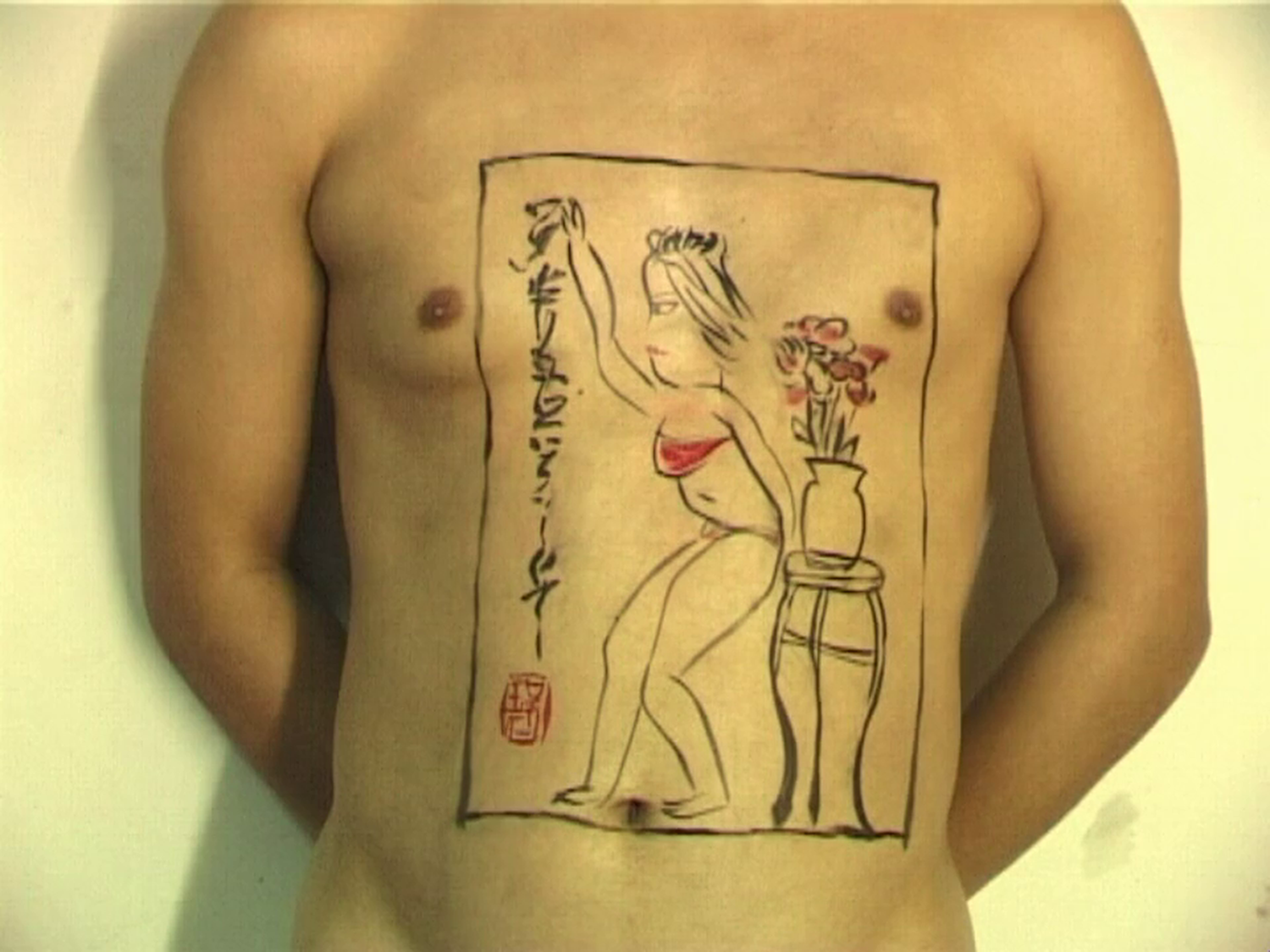
DE: The two early works in this exhibition, “The Gooey Gentleman” (2002) and “Conspiracy” (2004) evince a clear psychological and physical concern with both the power of the collective and that of the individual by making a distinction between the body as material on one hand, and as image on the other. In both works you have set up a dialectic between ideas of oppression and desire (sadism/masochism), and of expectation and desire (aspiration/consumption) by using the device of animating drawn, cartoon-like figures on both your own body and on the bodies of others. Images of sexuality, violence and revolution clash on this fleshy “canvas”. These ideas are often associated, in different ways, with the concept of “liberation” but, by presenting them in stories or parables, you seem to be issuing warnings about falsity and the calculated, or unwitting, manipulation of one body by many others. This seems to me a rather more interesting, and true to experience, approach than the usual political dichotomy made between and the collective and the individual body….
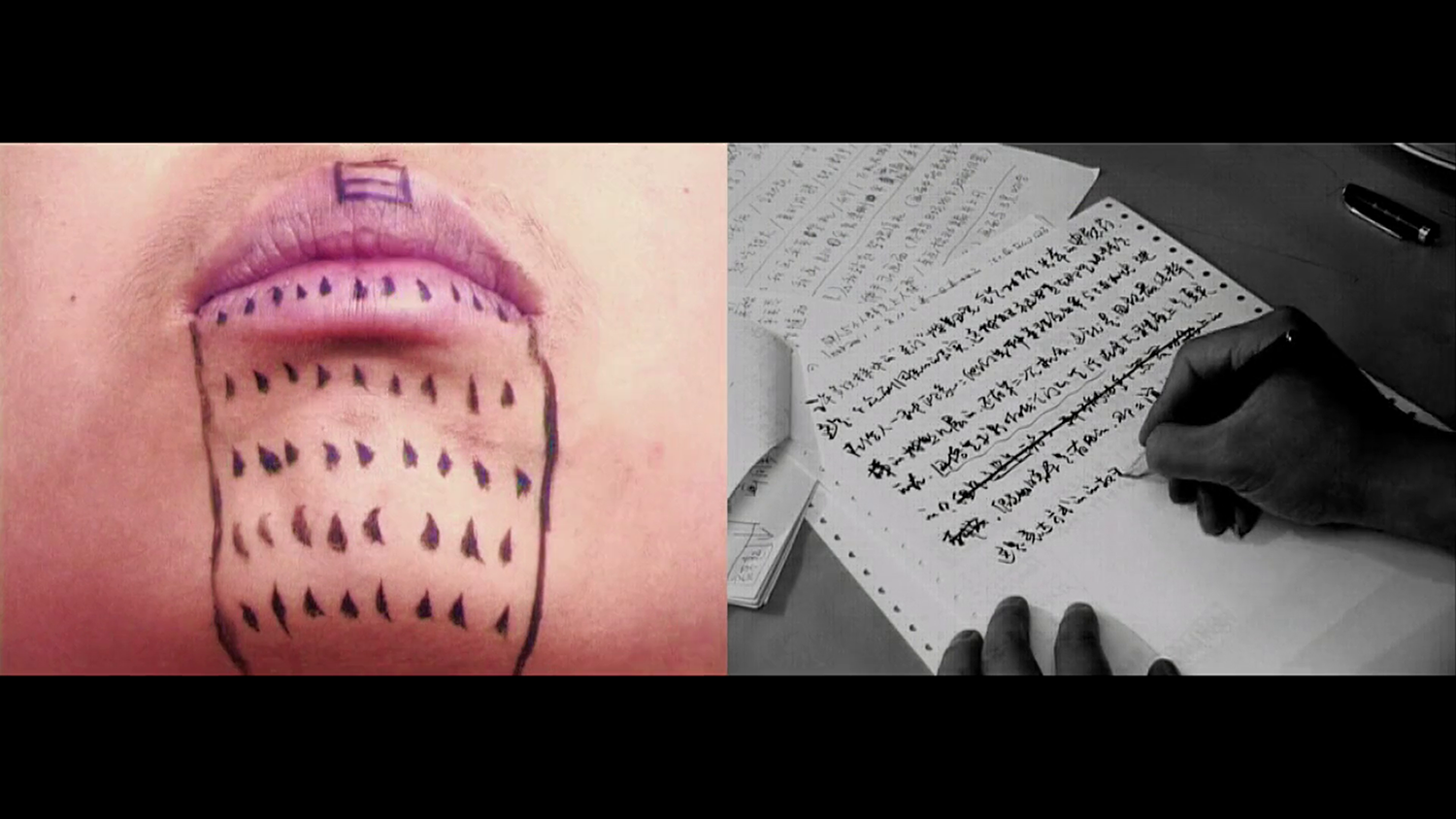
ZXH: Well, thank you for that exposition! When I made these works a lot of what I was doing was on an unconscious level, using different elements randomly. I made paintings on bodies, wiped them away, and shot images repeatedly. Zuoxiao Zuzhou, one of the pioneers of Chinese rock music, let me use his song Art Chicken in Gooey Gentleman and I am convinced that it was made specifically for this work. Furthermore, I think men get to know and build themselves up by “using” women and that this is the reason that “possession” of them becomes a battlefield for power. While many men adore female bodies in a conventional way or regard them as objects of desire, I prefer to concentrate on their political attributes in order to express more complex poetic feelings.
DE: In “Secret” (2012) the double-channel projection on a painted diptych in the exhibition, you juxtapose conflicting aphorisms about economy, society and art played in a loop with portraits of leading male world figures only to “assassinate” both their words and images with a single gun shot. These “revolutionary” thinkers—Karl Marx, Bertolt Brecht, Slavoj Žižek, Mao Zedong, Andy Warhol, Michel Foucault and Walter Benjamin—are however “completed” by the image of one woman, Sora Aoi, a Japanese porn star, to create a framework that in its leveling violence is, to say the least, sardonic.
The words chosen for Marx “All economy is finally reducible to the economy of time” are, like those of the other speakers, brought to a halt by the words of Ms. Aoi: “I took off all my clothes lying in front of the camera in order to survive. While you stand dressed in front of the camera, but only for desire and deception”. Her challenging, authoritative words and naked, crouched presence cement a clear relation between this work and “Das Kapital No. 1″ and, as in this, once the sequence has ended it is repeated, seemingly endlessly.
Viewing these works one after the other, I sense that while, for you, desire may be the fabric of life, unfortunately, it is deception, both historic and current, that is the thread that stitches this garment together. In your work this way of joining things up constitutes the greatest insult for the simple reason that it veils the human value of labor as well as the value of humanity itself.
ZXH: I would not disagree with this. You talk about my skepticism in the context of the “value of humanity” and I see these “opposites” as different sides of the same coin in that both can only be defined though a questioning that is actually an embodiment of conscience which enables us to face life in an honest way. By mixing up different media, genres and contexts in my work, I want to motivate people to question and understand what such concepts mean. I intend that the frameworks and structures that to a large extent characterize and “control” my work will, in fact, create something that is both boundless and beyond any control.
— By David Elliott



